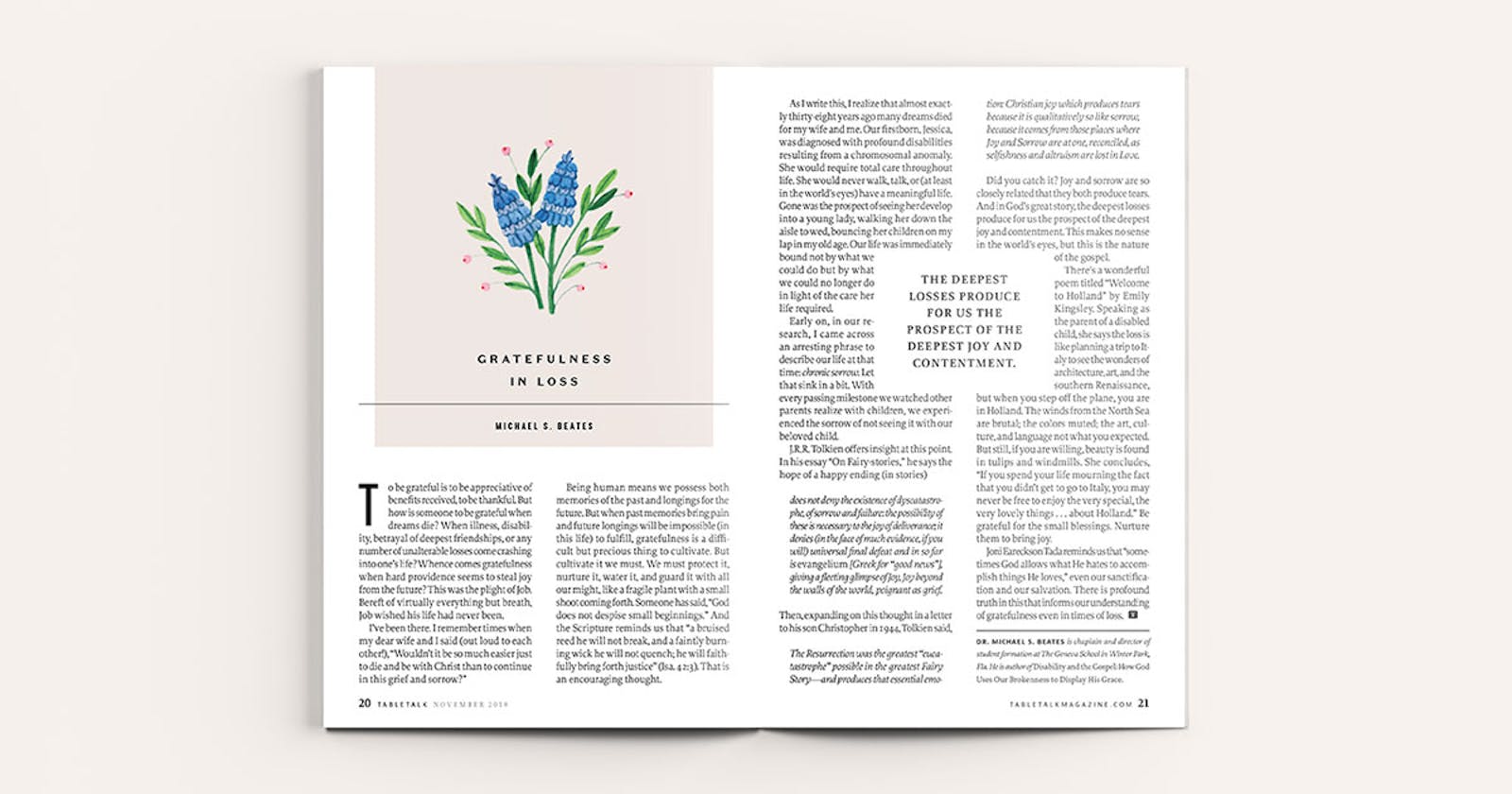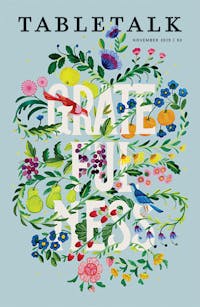
Request your free, three-month trial to Tabletalk magazine. You’ll receive the print issue monthly and gain immediate digital access to decades of archives. This trial is risk-free. No credit card required.
Try Tabletalk NowAlready receive Tabletalk magazine every month?
Verify your email address to gain unlimited access.
To be grateful is to be appreciative of benefits received, to be thankful. But how is someone to be grateful when dreams die? When illness, disability, betrayal of deepest friendships, or any number of unalterable losses come crashing into one’s life? Whence comes gratefulness when hard providence seems to steal joy from the future? This was the plight of Job. Bereft of virtually everything but breath, Job wished his life had never been.
I’ve been there. I remember times when my dear wife and I said (out loud to each other!), “Wouldn’t it be so much easier just to die and be with Christ than to continue in this grief and sorrow?”
Being human means we possess both memories of the past and longings for the future. But when past memories bring pain and future longings will be impossible (in this life) to fulfill, gratefulness is a difficult but precious thing to cultivate. But cultivate it we must. We must protect it, nurture it, water it, and guard it with all our might, like a fragile plant with a small shoot coming forth. Someone has said, “God does not despise small beginnings.” And the Scripture reminds us that “a bruised reed he will not break, and a faintly burning wick he will not quench; he will faithfully bring forth justice” (Isa. 42:3). That is an encouraging thought.
As I write this, I realize that almost exactly thirty-eight years ago many dreams died for my wife and me. Our firstborn, Jessica, was diagnosed with profound disabilities resulting from a chromosomal anomaly. She would require total care throughout life. She would never walk, talk, or (at least in the world’s eyes) have a meaningful life. Gone was the prospect of seeing her develop into a young lady, walking her down the aisle to wed, bouncing her children on my lap in my old age. Our life was immediately bound not by what we could do but by what we could no longer do in light of the care her life required.
Early on, in our research, I came across an arresting phrase to describe our life at that time: chronic sorrow. Let that sink in a bit. With every passing milestone we watched other parents realize with children, we experienced the sorrow of not seeing it with our beloved child.
J.R.R. Tolkien offers insight at this point. In his essay “On Fairy-stories,” he says the hope of a happy ending (in stories)
does not deny the existence of dyscatastrophe, of sorrow and failure: the possibility of these is necessary to the joy of deliverance; it denies (in the face of much evidence, if you will) universal final defeat and in so far is evangelium [Greek for “good news”], giving a fleeting glimpse of Joy, Joy beyond the walls of the world, poignant as grief.
Then, expanding on this thought in a letter to his son Christopher in 1944, Tolkien said,
The Resurrection was the greatest “eucatastrophe” possible in the greatest Fairy Story—and produces that essential emotion: Christian joy which produces tears because it is qualitatively so like sorrow, because it comes from those places where Joy and Sorrow are at one, reconciled, as selfishness and altruism are lost in Love.
Did you catch it? Joy and sorrow are so closely related that they both produce tears. And in God’s great story, the deepest losses produce for us the prospect of the deepest joy and contentment. This makes no sense in the world’s eyes, but this is the nature of the gospel.

There’s a wonderful poem titled “Welcome to Holland” by Emily Kingsley. Speaking as the parent of a disabled child, she says the loss is like planning a trip to Italy to see the wonders of architecture, art, and the southern Renaissance, but when you step off the plane, you are in Holland. The winds from the North Sea are brutal; the colors muted; the art, culture, and language not what you expected. But still, if you are willing, beauty is found in tulips and windmills. She concludes, “If you spend your life mourning the fact that you didn’t get to go to Italy, you may never be free to enjoy the very special, the very lovely things . . . about Holland.” Be grateful for the small blessings. Nurture them to bring joy.
Joni Eareckson Tada reminds us that “sometimes God allows what He hates to accomplish things He loves,” even our sanctification and our salvation. There is profound truth in this that informs our understanding of gratefulness even in times of loss.
